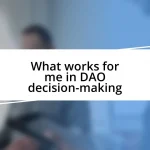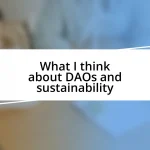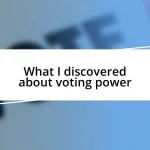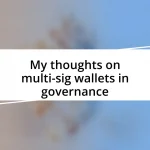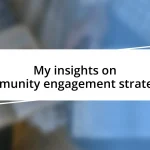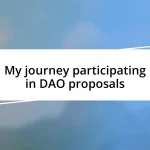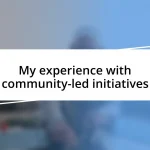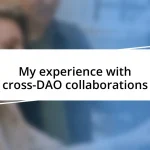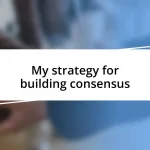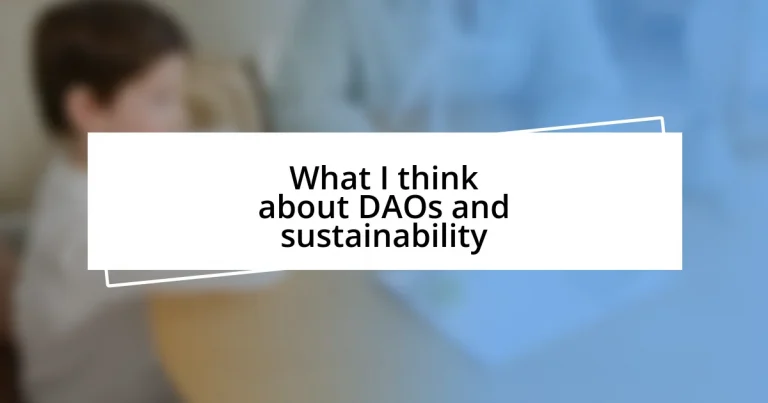Key takeaways:
- DAOs empower communities by facilitating collective decision-making, enhanced participation, and resource pooling for sustainability initiatives.
- Challenges such as decision-making inefficiencies, unequal participation, and technological barriers must be addressed to realize DAOs’ full potential for sustainability.
- Best practices for sustainable DAOs include fostering community engagement, implementing clear governance structures, and ensuring transparency in project metrics and outcomes.
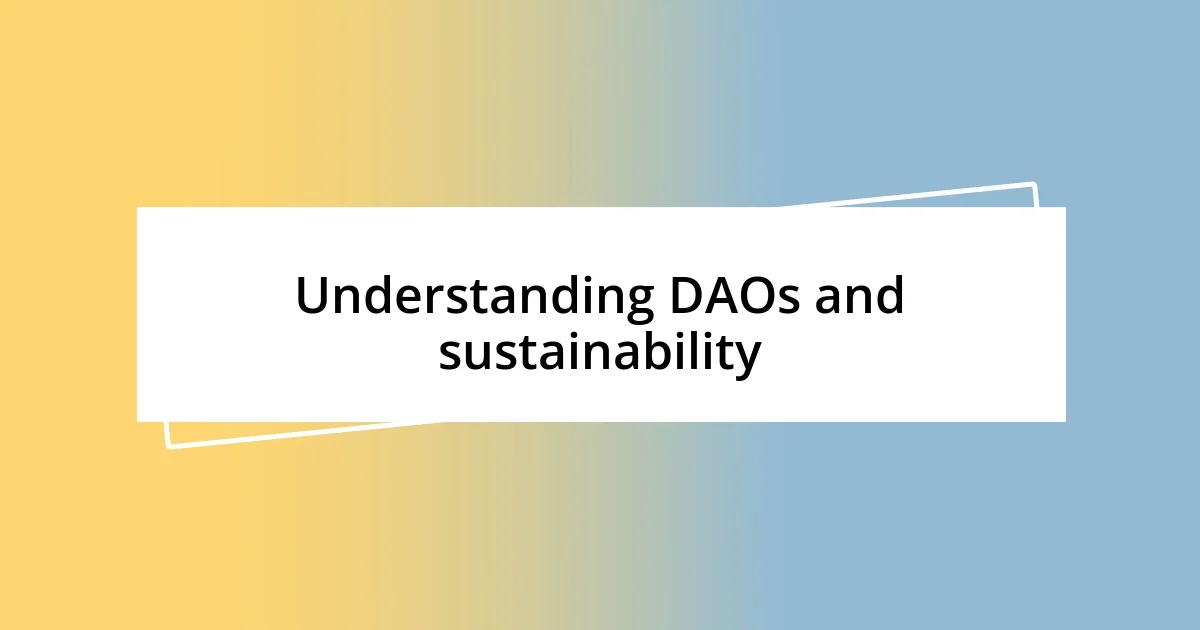
Understanding DAOs and sustainability
DAOs, or Decentralized Autonomous Organizations, leverage blockchain technology to create self-governing entities, free from traditional hierarchies. The idea of having a transparent and democratic structure really resonates with me; it feels like a step towards empowerment, doesn’t it? Imagine a community where decisions are made collectively, reflecting the values of all its members rather than just a few at the top.
Now, when we think about sustainability, the connection becomes fascinating. DAOs can tackle environmental issues by pooling resources and knowledge on a global scale, creating initiatives that individuals might find difficult to support alone. For instance, I remember participating in a DAO that funded renewable energy projects in underserved areas. The collective backing was not only uplifting but also demonstrated how collaboration can amplify our positive impact.
But is it enough to just have a decentralized structure? As we evaluate DAOs in the context of sustainability, it’s crucial to consider how effectively they can maintain long-term engagement and accountability. My experience suggests that while the technology is promising, the human element—trust and community connection—remains vital. What strategies can we implement to ensure that these organizations genuinely serve sustainability goals without losing sight of their mission?
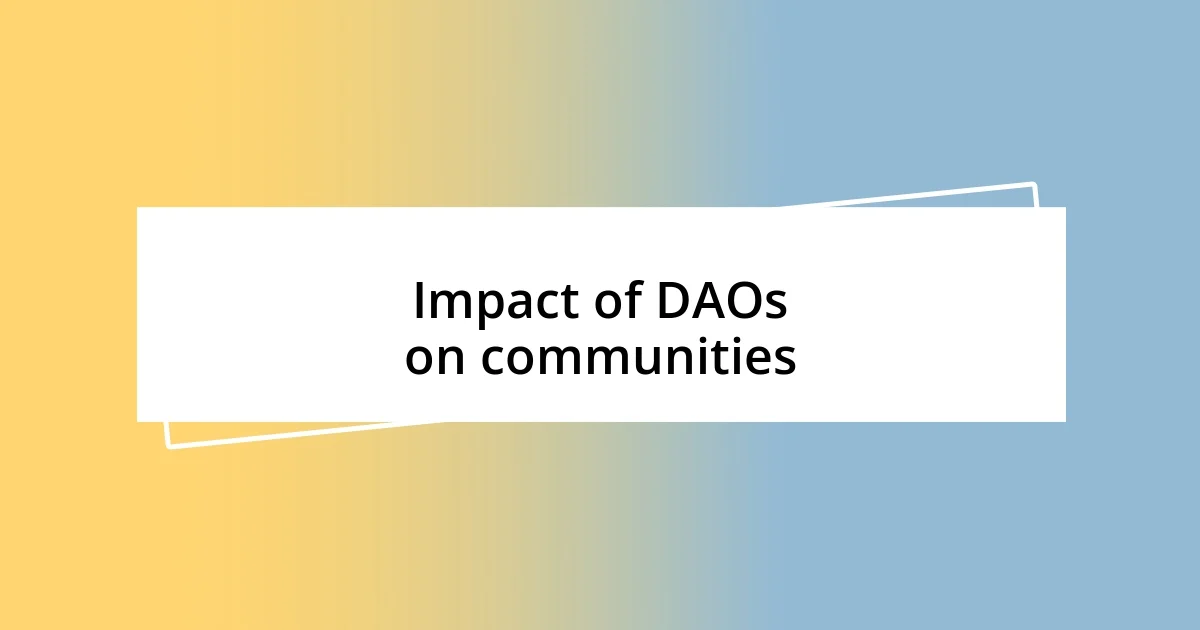
Impact of DAOs on communities
The impact of DAOs on communities can be profound, reshaping how members interact and collaborate. From my observations, these organizations often cultivate a sense of belonging and ownership among participants. For instance, I remember attending a community workshop organized by a DAO focused on sustainable agriculture. The level of engagement was incredible; people shared ideas and resources as if they were building a garden together. This collaborative spirit can empower communities to innovate and address local challenges collectively.
Let’s explore some specific impacts of DAOs on communities:
- Empowerment through participation: Members are more likely to feel invested in initiatives, leading to increased morale.
- Diverse perspectives: Inclusive decision-making allows for varied insights, enhancing project outcomes.
- Resource pooling: Communities can access a broader range of financial and intellectual resources than they might individually.
- Transparency and trust: Blockchain technology fosters an environment of openness, which is essential for long-term collaboration.
- Skill development: Participants often gain new skills and knowledge from one another, fostering personal and professional growth.
These attributes not only strengthen community ties but also contribute to innovative solutions in pursuing sustainability goals. I truly believe this shared journey cultivates resilience, nurturing a sense of accountability among participants.
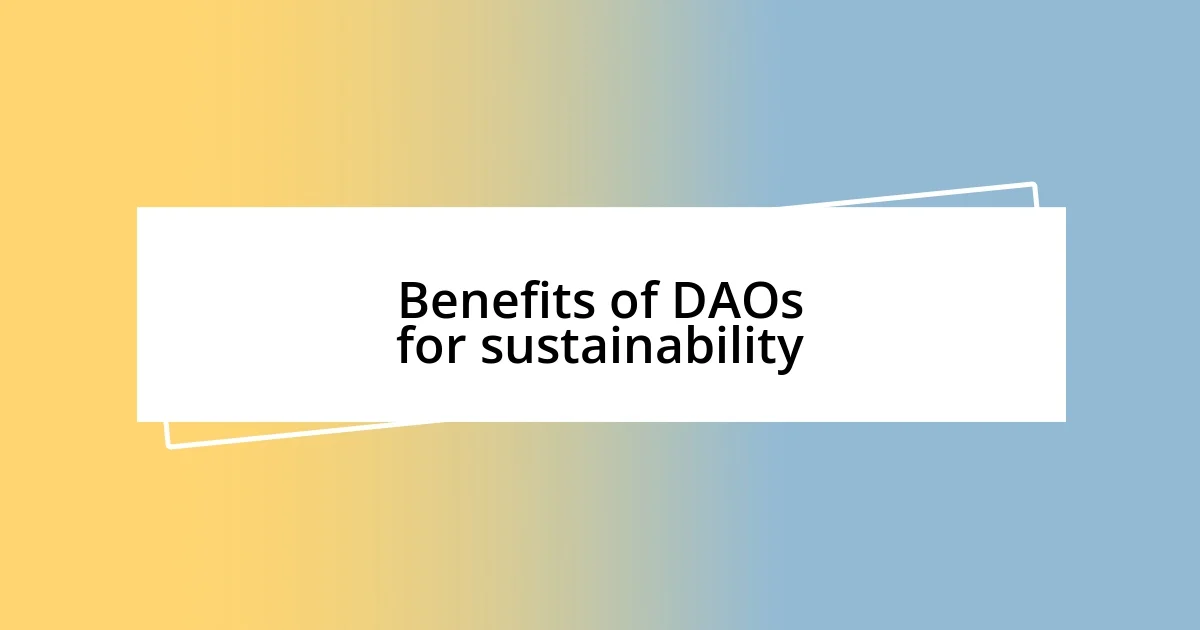
Benefits of DAOs for sustainability
DAOs bring several valuable benefits to sustainability, primarily through collaboration and resource sharing. I’ve seen how a well-structured DAO can unite diverse stakeholders around common environmental goals, making initiatives scalable. For example, I once joined a DAO that worked on tree-planting projects worldwide. The synergy among members significantly magnified our impact; we raised funds quickly and engaged local communities effortlessly, showing how collective participation can yield impressive results.
Another benefit that truly excites me is the potential for innovation through diverse input. When people from different backgrounds come together under a DAO, their unique perspectives can lead to creative solutions. I recall a brainstorming session where individuals proposed novel recycling methods that blended technology with traditional practices. This collaboration not only sparked brilliant ideas but also fostered a community of like-minded individuals passionate about sustainability. The enthusiasm in that room was contagious, and it made me feel that together, we could really tackle significant environmental challenges.
Lastly, the transparency that DAOs provide can bolster trust among participants, something I believe is crucial for sustainable initiatives. Traditionally, I’ve noticed many projects struggle with accountability. However, with a DAO’s blockchain foundation, members can see where funds are allocated, which fosters a sense of integrity. It’s reassuring to know that our contributions directly support causes we care about. In my experience, this transparency leads to longevity in engagement and a genuine commitment to sustainability goals.
| Benefit | Description |
|---|---|
| Collaboration | Unites diverse stakeholders for scalable initiatives. |
| Innovation | Diverse input generates creative solutions for challenges. |
| Transparency | Fosters trust through clear visibility of fund allocation. |
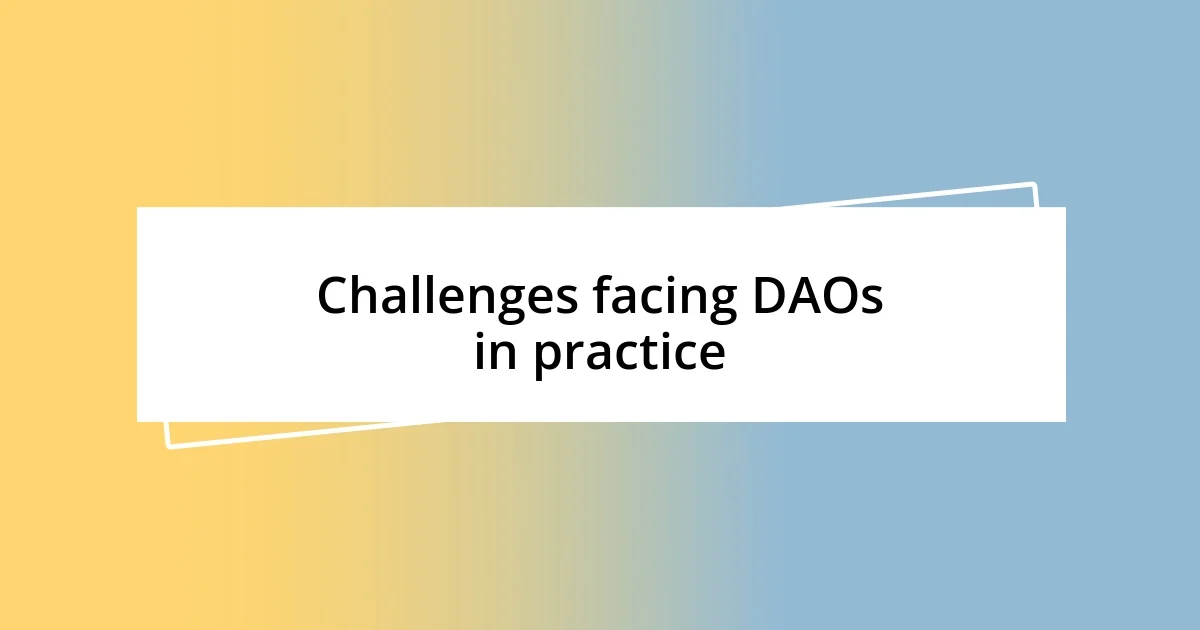
Challenges facing DAOs in practice
One of the most significant challenges I see facing DAOs in practice is decision-making inefficiencies. In my experience with a DAO focused on local environmental initiatives, we often found ourselves stuck in lengthy discussions. Have you ever been part of a group where too many voices made it almost impossible to agree? It can be frustrating. This struggle to streamline decisions can hinder momentum, especially when quick actions are crucial for addressing urgent sustainability issues.
Another issue arises from the varying levels of participation among members. I’ve noticed that in some DAOs, a small percentage of participants actively contribute, while others remain silent. It makes me wonder: how can we weave together a tapestry of diverse voices when only a few are speaking up? This imbalance can lead to disengagement and may even create rifts among community members, which can undermine the collaborative spirit that DAOs strive to foster.
Lastly, the technological complexities associated with DAOs can pose significant barriers. Not everyone is well-versed in blockchain or the platforms used by these organizations. I once tried to onboard a friend into a DAO dedicated to renewable energy and found that he struggled to navigate the tools. It left me feeling concerned about inclusivity. If members can’t easily participate or contribute due to tech challenges, is the DAO really living up to its ideals? These hurdles highlight the need for balancing cutting-edge technology with user-friendly solutions to ensure every voice can be heard and engaged.
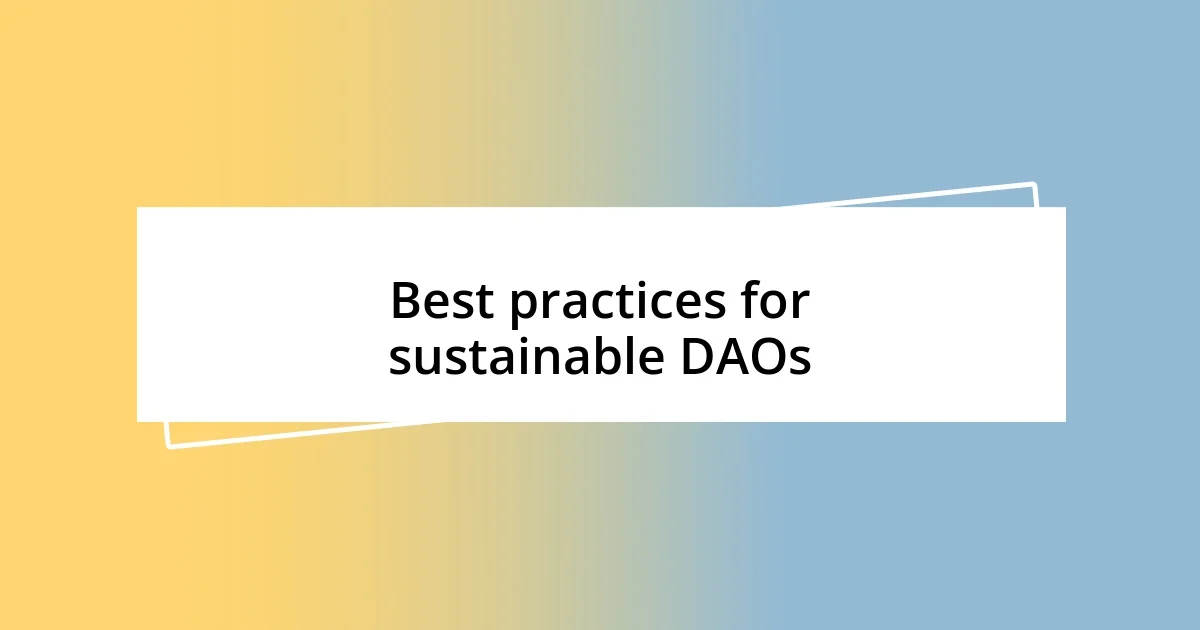
Best practices for sustainable DAOs
When it comes to establishing sustainable DAOs, prioritizing community engagement is key. I remember joining a DAO that emphasized active participation through regular brainstorming sessions. Everyone was encouraged to share ideas, and this collective belief in ownership transformed our projects. You can really feel the energy when all voices matter, and it results in creative and effective strategies that deeply resonate with everyone involved.
Implementing a clear governance structure is another best practice I’ve seen that makes all the difference. In one DAO I was part of, we adopted a tiered voting system that differentiated roles based on expertise. This not only streamlined decision-making but also empowered knowledgeable members to drive initiatives forward. It made me think about how important informed decisions are—after all, what’s the point in collaboration if we can’t utilize our strongest talents effectively?
Lastly, sustainability efforts thrive on transparency in metrics and outcomes. One DAO I collaborated with regularly published performance reports on community projects. This openness not only built trust but also allowed us to celebrate small victories together. Have you ever felt more motivated when you could see tangible results from your efforts? That’s exactly what such practices instill—the confidence that our collective actions lead to real change.
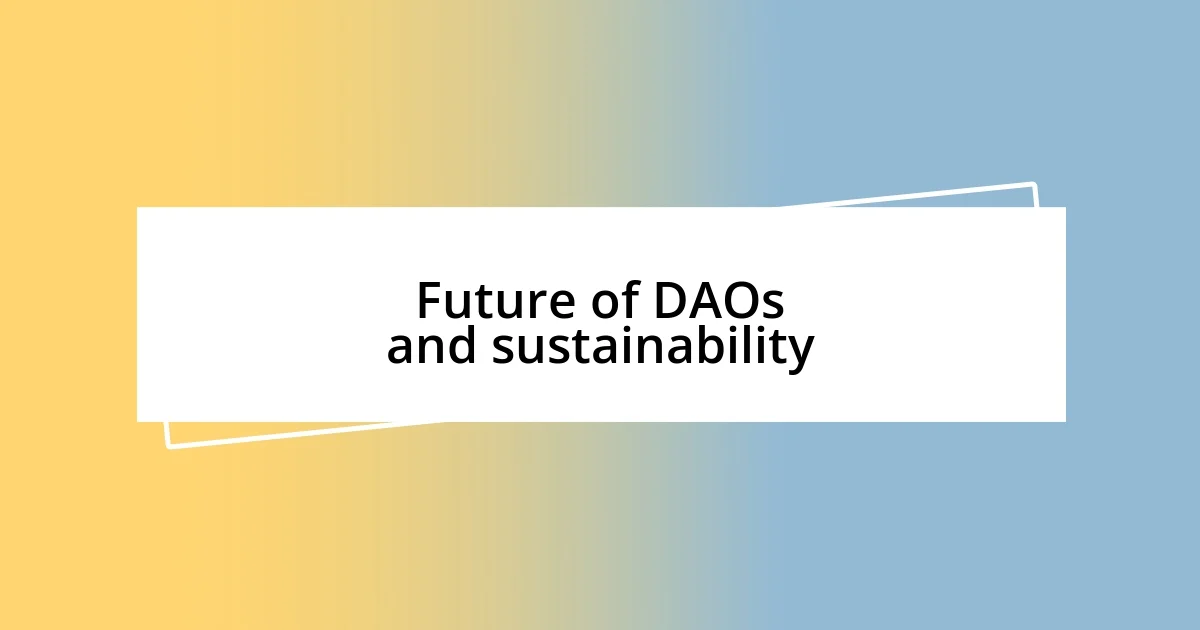
Future of DAOs and sustainability
Embracing the future of DAOs in sustainability is not just about technological innovation; it’s about building genuine connections. I remember a project where we tried to link local farmers with consumers through a DAO. The excitement was palpable as farmers shared their stories, but it also revealed an underlying vulnerability—how do we ensure their voices remain central as the community grows? This question resonates deeply with me because it highlights both the potential and the responsibility of DAOs to foster inclusivity and engagement as they evolve.
As DAOs continue to develop, I see a big opportunity to harness data for fostering sustainability. In a previous initiative I was involved in, we used data analytics to reveal energy usage patterns among our members. Seeing such clear insights prompted rich discussions and collective commitments to change behavior. It made me realize: how often do we leave this data in the background, when it could drive movements forward? This level of intentional data use could redefine how DAOs operate, creating a more informed community that takes action based on shared knowledge.
Looking ahead, I can’t help but wonder about the balance between decentralization and effective oversight. In one DAO I was part of, we faced challenges when no one felt responsible for monitoring project impacts. This experience made it clear to me that while decentralization is often championed, having dedicated roles or teams to oversee sustainability initiatives could be vital. So the looming question remains: how can we innovate in governance to ensure that every initiative not only starts strong but also sustains its impact long-term?
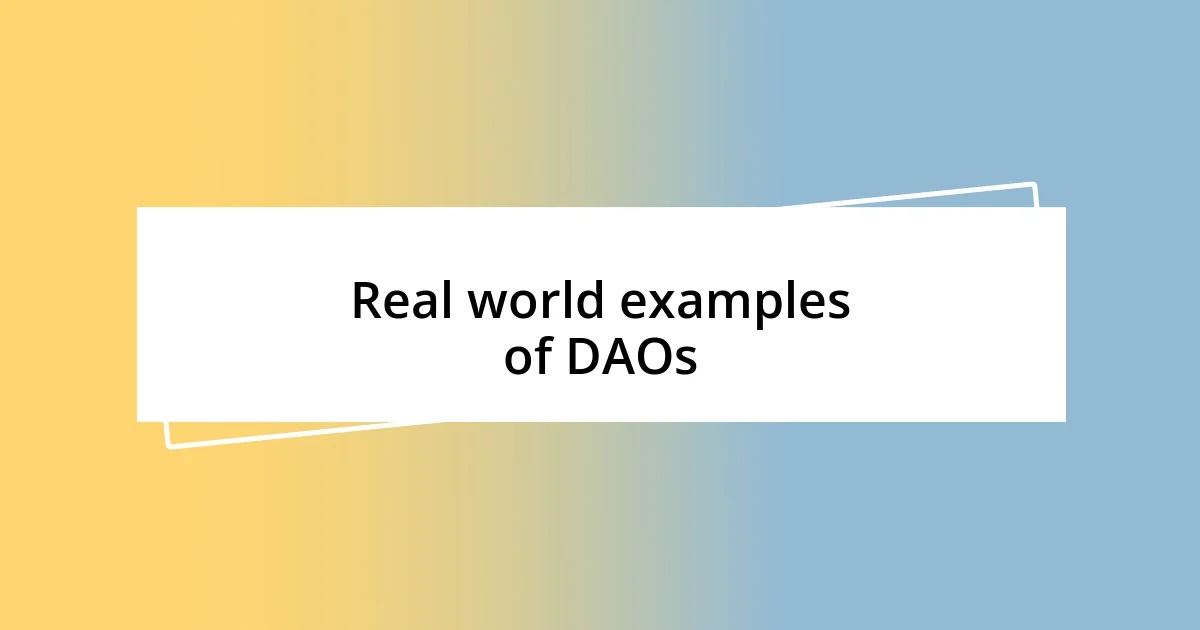
Real world examples of DAOs
I’ve seen some fascinating real-world examples of DAOs making waves in various sectors. For instance, one DAO I joined focused on environmental initiatives by pooling resources to fund local clean-up projects. It was rewarding to see how, through community voting, we collectively decided where to allocate funds. This feeling of direct impact is something I cherish; it’s like being part of a living organism that adjusts and thrives based on our shared desires.
Another intriguing example I came across was a DAO aimed at supporting artists. Members contributed funds to a shared pot that helped launch creative projects. When I participated in a vote to support a local muralist, the energy in the community was electrifying. It made me reflect on how empowering it is for artists to have direct backing from the community, rather than relying solely on traditional funding routes. Wouldn’t it be great if more artists had this level of support?
Then there’s the DAO dedicated to sustainable agriculture. Their innovative approach involved farmers directly engaging with consumers, allowing us to understand the story behind our food. I remember attending a virtual meet-up where a farmer shared their experiences; it was eye-opening. How often do we get that glimpse into the agricultural process without intermediaries? This model not only nurtured transparency but also fostered trust—essential ingredients for any thriving community.

